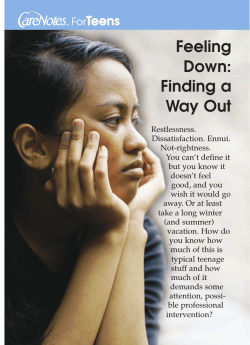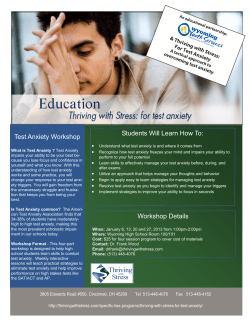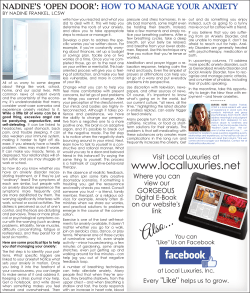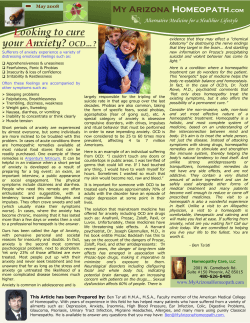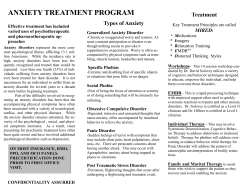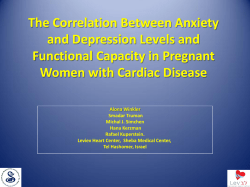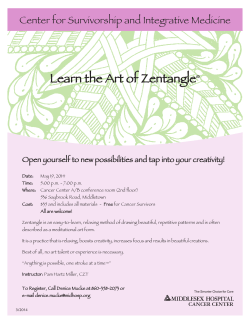
Manage and reduce stress 1
Manage and reduce stress 1 Contents 4Introduction 6 What is stress? 7 Physical symptoms 9 Behavioral and emotional symptoms 11 Post-traumatic stress disorder 12 What causes stress? 13Relationships 14 Work-life balance 16Money 18 Smoking, drinking and drug use 19 How can you help yourself? 22 Seeking help 24 101 Top tips from you 3 Introduction January is a particularly stressful time of year with money worries, the aftermath of Christmas, cold weather, shorter days, coming back to work and the pressures associated with the start of a new year proving difficult for many people. While stress affects everyone in one way or another, there are certain times and situations when pressure piles up and we need a little extra support to help us cope. As part of our work to help the nation lead mentally healthier lives, we have produced this pocket guide to present the facts about stress, how it impacts on you and applied steps towards reducing the symptoms, as well as 101 of your own best practice tips on how to reduce stress. So take some time out and have a read of our practical guide to a stress-free 2013. Happy New Year! Dr Andrew McCulloch Chief Executive Mental Health Foundation 4 How do you define stress? In brief, stress is a feeling of being under abnormal pressure, whether it is an increased workload, an argument with a family member, or financial worries. 5 What is stress? Physical symptoms While research has shown that some stress can be positive, making us more alert and helping us perform better in certain situations, stress is only healthy if it is short-lived. Excessive or prolonged stress can lead to debilitating illnesses such as heart disease and mental health problems such as anxiety and depression. Symptoms like these are triggered by a rush of stress hormones in your body which when released enable you to deal with pressures or threats – otherwise known as the “fight or flight” response. It is these hormones, adrenaline and noradrenaline, which raise your blood pressure, increase your heart rate and increase the rate at which you perspire, preparing your body for an emergency response. They can also reduce blood flow to your skin and reduce your stomach activity, while cortisol, another stress hormone, releases fat and sugar into your system to boost your energy. Stress affects us in a number of ways, both physically and emotionally, and in varying intensities. When events occur which make you feel threatened or upset your balance in some way, your body’s defenses take effect and create a stress response, which you may make you feel a variety of physical symptoms, behave differently and experience more intense emotions. 6 The most common physical signs of stress include sleeping problems, sweating and loss of appetite. As a result, you may experience headaches, muscle tension, pain, nausea, indigestion and dizziness. You may also breathe more quickly, have palpitations or suffer from various aches and pains and in the long-term you may be putting yourself at risk from heart attacks and stroke. 7 All these changes are our body’s way of making it easier for you to fight or run away and once the pressure or threat has passed, your stress hormone levels will usually return to normal. However, if you’re constantly under stress, these hormones will remain in your body, leading to the symptoms of stress. If you are stuck in a busy office or on an overcrowded train, you can’t fight or run away, therefore you can’t use up the chemicals your own body has produced to protect you. Over time, the buildup of these chemicals and the changes they produce can seriously damage your health. Behavioral and emotional symptoms When you are stressed you may experience many different feelings, including anxiety, irritability or low self-esteem, which can lead to becoming withdrawn, indecisive and tearful. You may experience periods of constant worry or racing thoughts and repeatedly going over the same things in your head. Some may experience behavioral changes, such as losing your temper more easily, acting irrationally or becoming more verbally or physically aggressive. These feelings can feed on each other and produce physical symptoms, making you feel even worse, particularly extreme anxiety which may make you feel so unwell that you then worry that you have a serious physical condition. You may experience periods of constant worry or racing thoughts and repeatedly going over the same things in your head. 8 9 Post-traumatic stress disorder stress can affect you emotionally making you feel withdrawn and tearful. Being exposed to very catastrophic, stressful and traumatic events that are outside the range of normal human experience can cause posttraumatic stress disorder (PTSD). This is an extreme form of stress where people experience flashbacks, panic attacks and other acute symptoms. Examples and causal events include rape, violent attack, traumatic accidents, sudden destruction of your home or community, or threat or harm to you or to your close relatives or friends, with deliberate acts of violence proving more likely to result in PTSD than natural events or accidents. PTSD is a potentially severe and long-term mental health problem that can impede your ability to live life to the full. People experiencing it can feel anxious for years after the trauma, whether or not they suffered a physical injury as well. It can be treated effectively, so it is important to get expert help. 10 11 What causes stress? All sorts of situations can cause stress, most commonly involving work, money matters and relationships with partners, children or other family members. Stress can affect us in varying levels, so while it may be caused by a major upheaval, such as divorce, unemployment, moving house or bereavement, a series of minor irritations, like feeling unappreciated at work or arguing with a family member, can be equally debilitating. Sometimes there are no obvious causes. 12 Relationships While relationships are a great support when we are feeling the effects of stress, from time to time the people close to us, be it a partner, parent, child, friend or colleague, can elevate the symptoms. Events such as ongoing minor arguments and disagreements to larger family crises, such as an affair, illness or bereavement are likely to affect the way you think, feel and behave and consequently have an impact on your own stress levels. 13 Work-life balance It’s estimated that about 10.4 million working days are lost each year through stress and anxiety-related conditions, costing industry more than £3 billion. The pressure of an increasingly demanding work culture in the UK is one of the biggest contributors to stress among the general population. An increased number of working hours, a heavier workload and lack of recognition from your employer can be damaging to your mental wellbeing, in turn causing greater levels of stress. Feeling unhappy about the amount of time you spend at work and neglecting other aspects of life because of work may increase your vulnerability to stress and, if not addressed, to more severe mental health issues. around 10.4 million working days are lost each year through stress and anxiety-related conditions, costing industry more than £3 billion. 14 15 Money Concerns about money and debt place huge pressure on mental wellbeing, so it comes as no surprise that they have a marked effect on our stress levels. The effects of the economic crisis have affected everyone in some capacity, and research shows hospitals in England dealt with 6,370 admissions for stress in the 12 months to May 2012; a seven per cent rise from the previous year. The combination of chronic stress and debt can result in depression and anxiety, therefore it’s important to take control of your financial situation by seeking out the support available to you. Concerns about money and debt place huge pressure on mental wellbeing 16 17 Smoking, drinking and drug use How can you help yourself? They can also put you more at risk of physical consequences of stress because of the damage done to the body. Research shows that smoking actually increases anxiety, with nicotine creating an immediate, but temporary, sense of relaxation and soon giving way to withdrawal symptoms and increased cravings. When you are feeling stressed, try to take these important steps: Many people use smoking and drinking alcohol as a means of reducing tension; however, they often make problems worse. Similarly, many people drink alcohol to deal with difficult feelings and to temporarily alleviate feelings of anxiety, when in fact alcohol can make existing mental health problems worse, and make you feel more anxious and depressed in the long-run. Therefore it is important to know the recommended limits which apply equally to mental and physical health. Medicinal drugs, such as tranquillisers and sleeping tablets, may have been prescribed for very good reasons, but they can also cause mental and physical health problems if used for long periods. Street drugs, such as cannabis or ecstasy, are usually taken for recreational purposes and often to alleviate symptoms of stress. For some people the problems may start as their bodies get used to the repeated use of the drug, and they need higher and higher doses to maintain the same effect. 18 Stress is a natural reaction to many situations in life, such as work, family, relationships and money problems. We’ve mentioned earlier on that a moderate amount of stress can help us perform better in challenging situations but too much or prolonged stress can lead to physical problems such as heart attacks, or mental illnesses such as depression. It is therefore important that we manage our stress in order to keep it at a healthy level, and prevent it from doing long-term damage to our bodies and minds. -- Realise when it is causing you a problem. You need to make the connection between feeling tired or ill with the pressures you are faced with. Do not ignore physical warnings such as tense muscles, over-tiredness, headaches or migraines. -- Identify the causes. Try to identify the underlying causes. Sort the possible reasons for your stress into those with a practical solution, those that will get better anyway given time, and those you can’t do anything about. Try to let go of those in the second and third groups – there is no point in worrying about things you can’t change or things that will sort themselves out. -- Review your lifestyle. Are you taking on too much? Are there things you are doing which could be handed over to someone else? Can you do things in a more leisurely way? You may need to prioritise things you are trying to achieve and reorganise your life so that you are not trying to do everything at once. 19 You can also help protect yourself from stress in a number of ways: -- Eat healthily. A healthy diet will help prevent you becoming overweight and will reduce the risks of other diet-related diseases. Also, there is a growing amount of evidence showing how food affects our mood. Feelings of wellbeing can be protected by ensuring that our diet provides adequate amounts of brain nutrients such as essential vitamins and minerals as well as water. Find out more about diet and mental health in our Healthy Eating and Depression booklet. -- Try to keep smoking and drinking to a minimum. We’ve covered in a previous chapter that even though they may seem to reduce tension, this is misleading as they often make problems worse. -- Get some restful sleep. Sleeping problems are common when you’re suffering from stress, but try to ensure you get enough rest. For more tips about how to get a good night’s sleep visit howdidyousleeplastnight.org. -- Have fun! One of the best antidotes for stress is enjoying yourself so try to bring some fun into your life by giving yourself treats and rewards for positive actions, attitudes and thoughts. Even simple pleasures like a relaxing bath, a pleasant walk, or an interesting book can all help you deal with stress. -- Try to keep things in proportion and don’t be too hard on yourself. After all, we all have bad days. -- Exercise. Physical exercise can be very effective in relieving stress. Even moderate physical exercise, like walking to the shops, can help. -- Take time out. Take time to relax. Saying ‘I just can’t take the time off’ is no use if you are forced to take time off later through ill health. Striking a balance between responsibility to others and responsibility to yourself is vital in reducing stress levels. -- Be mindful. Mindfulness meditation can be practiced anywhere at any time, and has been proven to reduce the effects of stress, anxiety and related problems such as insomnia, poor concentration and low moods. Our ‘Be Mindful’ website features a specially-developed online course in mindfulness, as well as details of local courses in your area (www.bemindful.co.uk). 20 21 Seeking help Do not be afraid to seek professional help if you feel that you are struggling to manage on your own. Many people do not seek help as they feel that it is an admission of failure. This is not the case and it is important to get help as soon as possible so you can begin to get better. The first person to approach is your family doctor. He or she should be able to advise about treatment and may refer you to another local professional. Cognitive Behavioural Therapy and Mindfulness based approaches are known to help reduce stress. There are also a number of voluntary organisations which can help you to tackle the causes of stress and advise you about ways to get better. Samaritans The Samaritans offer emotional support 24 hours a day - in full confidence. Call 08457 909090 or email jo@samaritans.org Specialist mental health services There are a number of specialist services that provide various treatments, including counseling and other talking treatments. Often these different services are coordinated by a community mental health team (CMHT), which is usually based either at a hospital or a local community mental health center. Some teams provide 24-hour services so that you can contact them in a crisis. You should be able to contact your local CMHT through your local social services or social work team. Anxiety UK Anxiety UK runs a helpline staffed by volunteers with personal experience of anxiety from 9:305:30, Monday to Friday. Call 08444 775 774. Mind Infoline Mind provides information on a range of mental health topics to support people in their own area from 9.00am to 6.00pm, Monday to Friday. Call 0300 123 3393 or e-mail info@mind.org.uk. Rethink Advice and Information Service Rethink provide specific solution-based guidance - 0300 5000927 Fax: 020 7820 1149 E-mail: advice@rethink.org 22 23 101 Top tips from you Thank you so much to those who came back with some brilliant tips on how to manage your stress. Everybody is different and what works for one person might not work for another. Here are a 101 tips provided by you. Why not give it a try? 1. Meeting a friend for a drink 2. Set aside 10 minutes a day to relax and collect my thoughts 3. Watching late night TV debates that deal with the realities of the world 4. Listening to relaxing music 5. Watching funny movies 6. Taking a good walk in the countryside 7. Going to the gym 8. Soaking in the bath with lavender oil 9.Meditating 10. Talking to someone just to vent a little 11. Walking the dog 12. Getting more sleep 13. Praying 14. Reading a book to distract yourself from your stressful thoughts 15.Do something good for someone else 16.Writing a letter to someone to get your feelings across and vent, but not actually sending it 17.Painting or drawing 18.Book a massage or spend time in a spa with a friend 19.Write a list of things to do and cross them off as you do them 20.Try putting things into perspective 21.Unplug the phone and get some time to yourself 24 22.Do something you like with family or friends like going to a show 23.Dancing around in your room to your favourite music 24.Going to your friend’s house with another friend and putting the world to rights 25.Have a change of scenery 26.Go out and meet new people 27.Go to a yoga class 28.Express your feelings and emotions 29.Spend time with positive people around you 30.A hot cup of something wonderful, a journal and a pen 31.Eat a healthy meal and avoid caffeine 32.Getting closer with nature e.g. have a walk at beach, observing the sunset 33.Watch your favourite programme on TV 34. Give yourself ‘me time’ just a few minutes to think about pleasant things 35.Ask yourself what would other people do 36.Thinking of the work you HAVE achieved in a day, rather than what you haven’t done 37.Relaxing with reflexology 38.Go to uplifting plays, operas and concerts that make the hairs on the back of your neck stand up 39.Go to bed at any time of day with a great book 40.Host a dinner party 41.Cheer up someone who is feeling down 42.Spend some time doing something you enjoy, like gardening 43.Writing down my thoughts 44.Play silly mind numbing games on the computer 45.Avoid putting things off 46.Find a quiet place and try to visualise a happy memory 47.Do something creative like knitting 48.Play a musical instrument 25 49.Play with your pet 50. Get some fresh air 51. Be gentle to yourself 52. Laugh! 53. Go window shopping 54. Write short stories 55. Call a loved one 56. Talk to a stranger 57. Practice CBT 58. Chat to your friends on Skype or Facebook 59. Take a nap 60. Take a break, even a short one can make a difference 61. Going for a walk at lunchtime 62. Write poetry 63. Enjoy a glass of wine 64. Cuddle a baby (ideally one you know – cuddles with my niece or nephew are amazing for destressing) 65. Spend time with children – they really put things in perspective, like ‘Wow there’s a cool cloud’, and remind you of simple things that used to amaze you 66. Go out to a Karaoke night 67. Imagine living in a different era, maybe war time or before cars and trains were invented and how much harder life would be 68.Bake a cake 69.Sitting in a café with a cup of tea and a magazine 70. Go for a relaxing swim 71.Sit on a park bench and watch the world go by 72.Tidy a room or cupboard (other people might find this stressful, but I find it relaxing!) 73. Challenge a friend to a game of Scrabble 74. Breathe deeply for two minutes, and focus on your breaths 75. Make something – knit a scarf, build an Airfix model 26 76. Write a list of the reasons you have to be happy with life 77. Take a minute to stretch your body 78. Use a relaxing room fragrance or scented candle to create a sense of sanctuary 79. Practicing Tai Chi 80. Looking at photos of happy memories 81. Have a cup of tea 82. Thinking of something you’re looking forward to or something that was fun 83. Go to the cinema 84. Aquafit classes at lunchtime 85. Go for a bike ride 86. Listen to the birds singing 87. Reminding yourself it could be worse and count your blessings 88. Playing board games with your family 89. Playing my favourite song and singing it out loud 90. Cleaning! 91. Practicing calligraphy 92. I find moving furniture around the house very soothing 93. Write a letter to a loved one 94. Play with my children 95. Watch some mind numbing programs on TV like X Factor 96. Go out for a run in the park 97. Volunteer at the local homeless shelter, it helps put my worries into perspective 98. Play Sudoku or crosswords 99. Read some gossip magazines 100. Go to a salsa class 101. Get a cuddle 27 Mental Health Foundation Colechurch House 1 London Bridge Walk London SE1 2SX Telephone 020 7803 1100 Email info@mentalhealth.org.uk Website www.mentalhealth.org.uk Registered Charity No. England 801130 Scotland SC039714 28
© Copyright 2025





